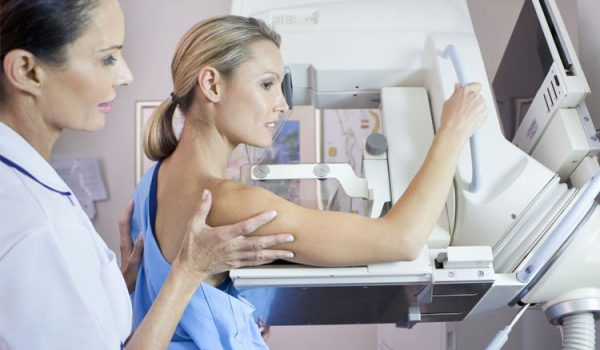We’re in a GP’s office in Darlinghurst, shooting the start of a documentary about breast cancer. The woman with the frigid mitts is showing me how to examine my breasts, something – I’m ashamed to say – I’ve done sporadically, at best.
Apparently I’ve been doing it wrong, poking and prodding with the tip of my finger instead of smoothing and sliding along its length. What an idiot. You see, I’m considered to be at high risk*.
Like most women aged in their 40s, I have dense breasts, so it’s difficult to detect lumps using traditional 2D mammograms, which work best for women over 50. To make matters worse – I don’t know how else to say this – half of my family has been killed by cancer.
For Mum and Grandad it was pancreatic, which is also linked with the BRCA1 gene. In my mid-30s, I found a lump in my right breast: it turned out to be a ‘false positive’.
But I STILL didn’t take it seriously.
Since then, I’ve put my head in the sand: “Oh no, I can’t go and get tested because, well, I’m busy with the kids! Work is flat out. I guess I’m scared about what they might find. And those mammograms – yowser! Don’t they hurt like hell?” I decide the time for complacency is over when two dear friends are diagnosed with the disease. In both cases, they find it early: the five-year survival rate is 96 per cent.
But it’s still the most common cancer in Australian women. Incredibly, almost two-in-three women know someone who’s been diagnosed, yet only 23 per cent do “adequate self-detection”, according to a national survey released today. Among those at high risk, one-in-three examines her breasts monthly, while one-in-five rarely, or never, does.
Despite all of the awareness and fundraising campaigns, we’re dangerously negligent when it comes to our health. You know that old thing about women being good talkers? How we’re comfortable sharing our problems with others? And open up with doctors about our concerns. It’s no longer true.
Women in the so-called sandwich generation – raising kids, caring for ageing parents, and doing both paid and unpaid work – are communicating more like men. When we get together, we don’t open up the way we used to: Frankly, we’re too bloody busy.
That’s why I’m doing this documentary. Sure, it’s confronting to flop your tits out in front of total strangers. But nowhere near as confronting as finding out you have cancer too late.
During the week of filming, I’m privileged to meet many remarkable women, each of whom has a different diagnosis. It makes me realise that breast cancer is not one-size-fits-all. But they all say the same thing: “You just don’t think it’s going to happen to you.”
Annette Odgers, 49, found a lump in her breast at the age of 28, when she was 10-weeks pregnant. “I was told it was either me or the baby,” she remembers.
Annette lost her baby.
Despite undergoing a lumpectomy, she was diagnosed with a second cancer in the same breast: this was initially missed on a 2D mammogram. Genius 3D mammography, which is now available in Australia, detects 41 per cent more invasive breast cancers, because it examines the tissue layer by layer, in 1mm ‘slices’. After overcoming an irrational fear of having pancake-boobs, I book in for a 3D mammogram. Well, guess what? It doesn’t hurt a bit. Uncomfortable, yes, but not painful.
The images are extraordinary.
“Mum, that looks like a huge planet with a nipple on the side!” my nine-year-old daughter, Grace, remarks, after seeing the x-rays. Fortunately, I am clear of cancer. But I’m one of the lucky ones. Krystal Barter had her breasts removed at the age of 25, after finding out she carried the BRCA1 gene. Hereditary cancer had ravaged her family: having a mother, sister or daughter with breast cancer approximately doubles a woman’s risk.
Funnily enough, she considers herself The Lucky One, too: it’s the title of her book. Why? Because knowing her family history allowed her to be proactive. As I sit half-naked in the GP’s office, I don’t feel exposed: I feel empowered. Now, I’m on a mission to encourage women to take action.
Assess your risks; know your breasts; and see a doctor. It’s as simple – and potentially life saving – as that.
Watch Tracey’s full documentary here and, for every view and share, $1 will be donated to the breast cancer prevention charity, Pink Hope, founded by Krystal Barter. Further information on Pink Hope is available here
You are at high risk if you
- Notice any breast changes or lumps
- Have a strong family history of breast or ovarian cancer
- Were previously diagnosed with breast disease
- Have dense breasts (eg. women in their 40s)
- Require further assessment after an inconclusive 2D mammogram
Talk to your doctor about Genius 3D Mammography. Information about breast cancer detection methods is available via this website








